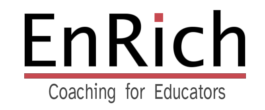Educational frameworks require managers in government-funded educational establishments to “coach” their staff, but not many educators know what coaching is or how to use it within an educational setting. EnRich helps by developing a coaching training programme tailored to your needs.
For example, the Early Years Statutory Framework of 31st March, 2021 states:
3.23. Supervision should provide opportunities for staff to: • discuss any issues – particularly concerning children’s development or wellbeing, including child protection concerns • identify solutions to address issues as they arise • receive coaching to improve their personal effectiveness
Instead of equipping people to release their own strengths, managers who don’t understand coaching tend to become prescriptive (telling people what to do), or to mentor (sharing their own skills and experiences), or to act like consultants (using their own skills to solve their coachees’ problems). These differences may be subtle, but they are significant. True coaching equips people to discover their own solutions, without developing a lasting dependence on the coach.

Custom-designed to meet your needs

The EnRich process begins with a preliminary meeting with your team coordinator to discuss the ethos and values of your school or setting, as well as specific issues that need attention. During this meeting we will define your desired outcomes.
We will develop a training module to train your senior staff in the effective use of coaching techniques in their daily practice, including staff supervision, appraisals, professional discussions, and in dealing with challenging working relationships. The module will be specific to the needs of your organisation, and will cover topics such as:
- An explanation of what coaching is, and what it isn’t
- Coaching techniques and tools
- Body language in the context of coaching
- Content covered through coaching
- Outcomes that may be achieved through effective coaching
Interactive, cooperative, friendly
Our approach to training is highly interactive. Questions are encouraged, and we make time for discussion.
The module will include both theoretical training and practical exercises. Each participant will also receive written material designed to reinforce the training they receive.
The location and timing of training will be determined to suit your organisation’s needs. It can be done after hours or during regular working hours, either at your facility or in an off-site location. Typically sessions last 90-120 minutes, with a short break after the first hour.

